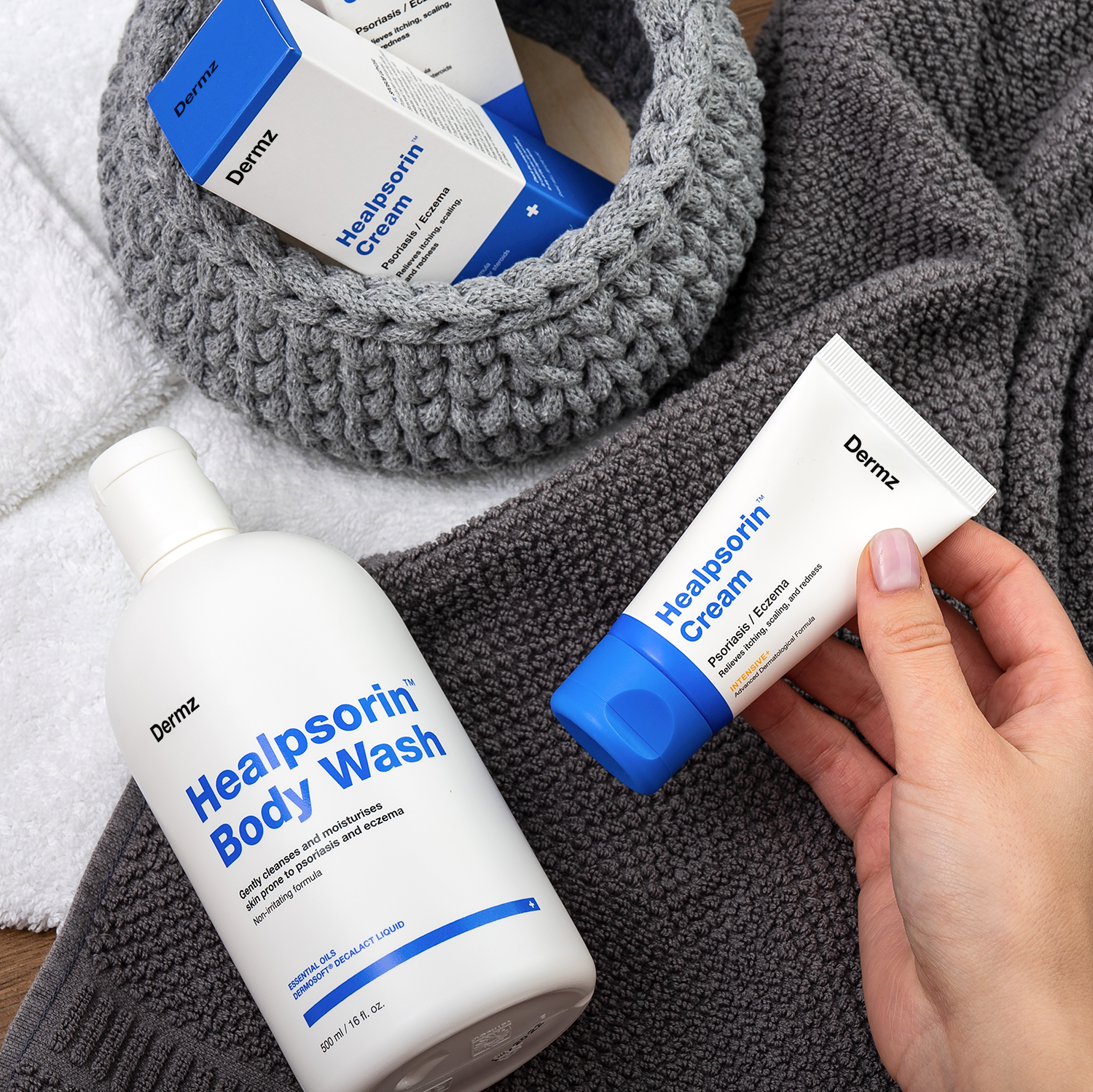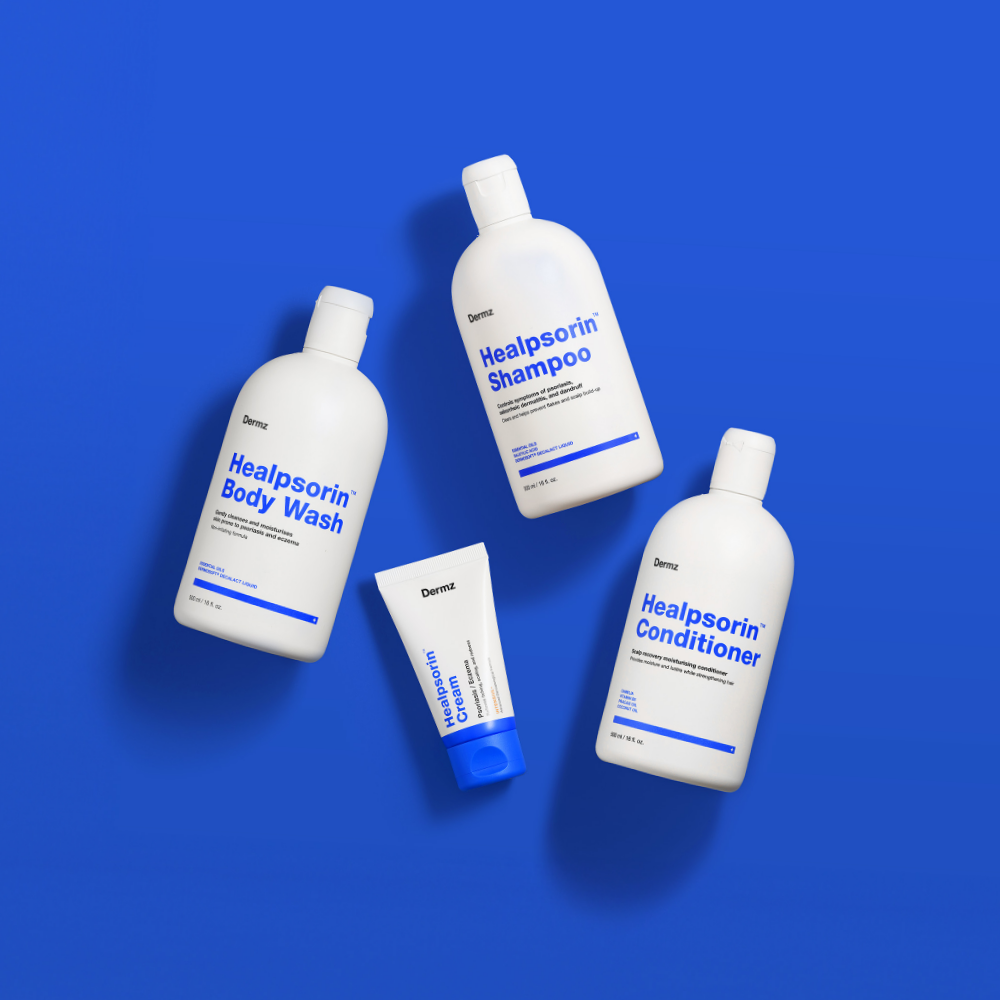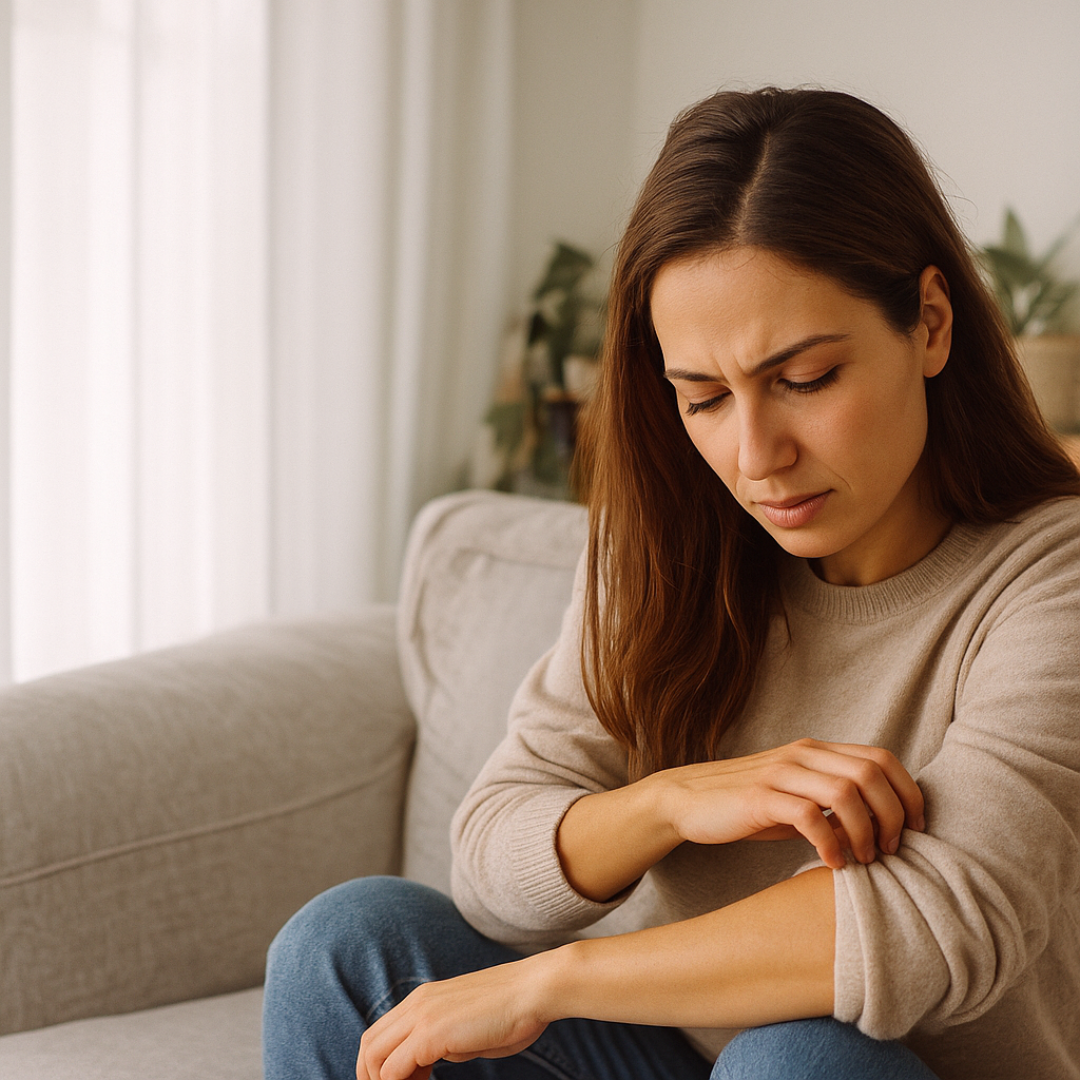More than just redness and itching, psoriasis and eczema are chronic conditions that demand a strategic approach. Scratching or picking at scales only fuels further inflammation, creating a vicious cycle. Instead of focusing solely on symptoms, prevention and barrier protection with dermocosmetics like an eczema cream or body balm for psoriasis can make a lasting difference.
Beyond the symptoms - why psoriasis and eczema need a strategy
Psoriasis and eczema are not simply skin irritations; they are chronic inflammatory conditions with deep immune and barrier dysfunctions. The most visible signs – itching, redness, dryness – are just the surface of a bigger problem. Mechanical scratching tears fragile skin, triggers micro-injuries and often leads to secondary inflammation or infection. Without breaking this cycle, flare-ups become harder to control. That’s why prevention and barrier support with cream for atopic dermatitis or a body balm for sensitive skin should be part of every routine.
Breaking the itch-scratch cycle in psoriasis and eczema
One of the biggest challenges in managing psoriasis and eczema is the vicious circle of itching and scratching. Itching provokes scratching, scratching damages the skin and worsens inflammation, which in turn increases itching again. This cycle can quickly escalate flare-ups and delay healing.
How to interrupt the cycle?
- Apply a psoriasis cream or eczema cream at the first sign of itching.
- Use a cream for irritated and red skin to calm micro-inflammation before it spreads.
- Keep nails short to reduce skin damage when scratching is unavoidable.
- Hydrate daily with a body balm for itchy skin to reduce dryness that fuels irritation.
By addressing triggers early, dermocosmetics help stop flare-ups before they become severe.
A holistic approach: lifestyle, diet and stress management
Psoriasis and eczema are not only skin-deep. Stress hormones, poor diet and lack of sleep can all weaken the immune system and intensify flare-ups. That’s why prevention requires more than just a cream for dry skin or cream for atopic dermatitis - it also means adjusting daily habits.
Simple changes that support skin health:
- Balanced diet – rich in omega-3, zinc and antioxidants to strengthen the skin barrier.
- Stress reduction – yoga, meditation or breathwork can lower inflammation.
- Quality sleep – supports regeneration and barrier repair.
- Gentle fabrics – reduce friction that can trigger irritation.
- Regular moisturising – applying a body balm for eczema or a body balm for sensitive skin maintains hydration and reduces itching.
Combining dermocosmetics with lifestyle care helps prevent flare-ups before they start.
The role of the skin barrier - why standard cosmetics are not enough
The hydrolipid barrier is the skin’s natural defense against water loss and external irritants. In psoriasis and eczema, this barrier is disrupted, which is why the skin becomes dry, itchy and more vulnerable to inflammation. Standard cosmetics often provide only superficial hydration, without repairing deeper damage.
This is where dermocosmetics make the difference. A cream for irritated and red skin or a cream for atopic dermatitis contains actives that not only moisturise but also calm inflammation and strengthen the barrier. At the same time, a body balm for psoriasis or body balm for sensitive skin creates a protective film that locks in hydration and prevents flare-ups.
Supporting the barrier daily is essential - once it is reinforced, the skin becomes more resilient, flare-ups occur less frequently, and healing is faster.
Healpsorin products - prevention with cream and body balm
Preventing flare-ups means daily hydration plus targeted care during crises. Healpsorin offers both:
- Healpsorin Emollient Balm - ideal as a body balm for eczema, body balm for psoriasis, or body balm for itchy skin. Its emollient-rich formula locks in moisture, rebuilds the lipid barrier and soothes dryness before it turns into itching. Using this body balm for sensitive skin every day reduces the risk of flare-ups.
- Healpsorin Cream - works as a powerful eczema cream, psoriasis cream, or cream for atopic dermatitis when the skin enters an active flare. Packed with anti-inflammatory and regenerative actives, it acts like first aid for irritation, redness and micro-cracks.
Together, the cream for dry skin and the emollient balm create a two-step routine: prevention and crisis care.
Prevention is the real win in psoriasis and eczema care
Living with psoriasis or eczema means more than treating flare-ups – it’s about preventing them. Strengthening the skin barrier with the right dermocosmetics is the first line of defense. A cream for dry skin or cream for irritated and red skin reduces inflammation when it appears, while a body balm for sensitive skin or body balm for eczema keeps hydration levels stable day after day.
By combining daily prevention with targeted crisis care, skin becomes stronger, less reactive and more resilient against external triggers. Psoriasis and eczema may be chronic, but flare-ups don’t have to control your life. Protect your hydrolipid barrier today to prevent tomorrow’s problems.
FAQ
What is the difference between psoriasis and eczema?
Psoriasis is an autoimmune condition causing thick, scaly plaques. Eczema is often linked to allergies or atopy and causes red, itchy, inflamed patches.
Are psoriasis and eczema contagious?
No. Neither condition is contagious. They are chronic inflammatory skin diseases influenced by immune response and environmental triggers.
Why is daily moisturising so important?
Dry skin increases itching and flare-ups. Regular use of an eczema cream or body balm for sensitive skin helps lock in hydration and protect the barrier.
What is the itch–scratch cycle and how can I break it?
Itching leads to scratching, scratching causes more inflammation and itching. Break it with a cream for irritated and red skin and a body balm for itchy skin to calm the urge.
How does stress affect my skin?
Stress hormones increase inflammation and weaken the immune system, making flare-ups of psoriasis and eczema more frequent and severe.
Does diet matter in managing psoriasis and eczema?
Yes. A balanced diet with omega-3s, vitamins and minerals supports the skin barrier and reduces inflammation, helping to prevent flare-ups.
Can I use standard cosmetics for skincare?
Standard cosmetics often lack barrier-repairing actives. Dermocosmetics such as psoriasis cream or body balm for eczema provide deeper, more effective support.
How often should I use Healpsorin Emollient Balm?
Daily, ideally twice a day. Consistent application helps maintain hydration and prevents flare-ups caused by dryness.
When should I use Healpsorin Cream versus Emollient Balm?
Use the balm daily for prevention and hydration. Apply Healpsorin Cream during flare-ups as a targeted eczema cream or psoriasis cream.
Can psoriasis and eczema completely disappear?
They are chronic conditions, so they cannot be fully cured. However, with proper care, flare-ups can be controlled and periods of remission extended.






